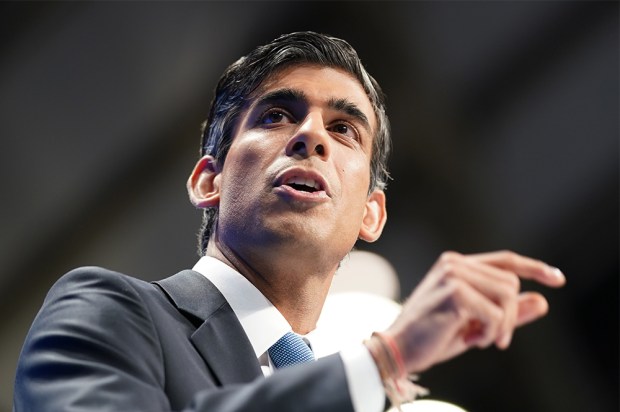For years the government has appeared to be setting itself up for failure with its promises to crack down on illegal immigration. The plan to process asylum claims in Rwanda was always going to excite immigration lawyers. Sure enough, it remains mired in the legal process. Even if the government wins its case in the Supreme Court, there remains the vast obstacle of the European Court of Human Rights.
The promise to ‘stop the boats’ was a hostage to fortune. The boats continue to arrive; it is not possible to patrol every square inch of the English Channel. The discovery of legionella bacteria on the Bibby Stockholm, the barge on which the government is planning to house asylum seekers, seemed at the time to be the final straw for the hapless Home Office.
And yet there are glimmers of hope that the government’s strategy might finally be working. At the start of the year, the Border Force expected 65,000 asylum -seekers to arrive on small boats during 2023. The real number now looks like being half that: 26,000 have arrived so far, two-thirds of the number who had come by this stage last year. Meanwhile there are reports that the processing of applications has sped up. The government was able to announce this week that 100 hotels will no longer be used to house asylum seekers.
This may be too late to revive the Conservatives’ electoral fortunes. To judge by last week’s by-elections in Tamworth and Mid Bedfordshire, many voters have already decided that this government has run its course. Anyone who lives in a town where the main hotel has been turned over to asylum applicants – leading to lost jobs, cancelled weddings and a sense of decay – is unlikely to be impressed by the latest statistics, or even notice that there has been a substantial fall in arrivals.
Even so, it is important to acknowledge success, and as a magazine which has often been critical of government migration policy, we are pleased to be in a position to do so. One of the biggest breakthroughs was a deal made with Albania last December to rapidly return illegal arrivals from that country – as a result, numbers have fallen by 90 per cent. A deal with French border officials seems, for once, to have paid off, with more boats being intercepted in French waters.
It is remarkable that the UK government has succeeded in turning the tide on illegal migration while being outside the EU. Critics regularly claimed that Brexit would make it more difficult to persuade other European countries to cooperate with Britain on efforts to confront migration. Yet whether we are inside or outside the European Union, our neighbours have a vested interest in interrupting the chain of migration towards Britain. It is not in France’s interests to allow the Calais area to be used as a staging post for asylum applicants. And we do not need the EU to broker agreements of mutual interest, especially when they involve Britain paying French border officials.
The real opponents of the government’s efforts to tackle illegal migration are not in France; they are in Britain. There is a powerful lobby for which all migration is an unalloyed good, and any attempt to thwart it is evil. For this group of lawyers and campaigners, no migrant has ever sought to misuse the asylum system by claiming to be in danger when they are not; no criminal or terrorist has ever tried to slip into the country under the guise of false claims of persecution in their homelands – and anyone who claims they do is bigoted.
It is very difficult for a government to do anything to tackle illegal migration in this atmosphere, when every home secretary is portrayed as more heartless and extreme than the last, and when any new initiative attracts a flurry of human rights claims, supercharged with legal aid.
Nevertheless, ministers have a habit of making life more difficult for themselves than it needs to be. The very worst thing they can do is announce tough policies which they know cannot be delivered. Before embarking on the Rwandan scheme, it should have been obvious that something would first need to be done to head off legal claims, whether that meant withdrawing from the European Convention on Human Rights or protecting the government from its judgments, or curtailing the availability of legal aid for asylum claims. Without the government being prepared to think through the consequences, the Rwandan scheme should never have been contemplated at all. If the aim was to provoke a battle with the pro-asylum lobby and thus earn public support, it has failed miserably. The government has merely made itself look weak.
In the meantime, however, lower-profile initiatives such as the aforementioned Albania deal have begun to bear fruit. The biggest problems with the asylum system are the slowness of the decisions and the failure to deport failed applicants in a timely fashion. The case of the Liverpool bomber Emad al-Swealmeen is an example of everything that has gone wrong. It was not that he managed to slip through the application process: his lies were exposed and he was rejected, but he was then able to drop off the radar while he planned his attack.
The fact that asylum claims are reportedly being handled more quickly is a promising sign. The system is still far from satisfactory, and there are still far too many people arriving in small boats and by other means. But the long campaign against illegal migration does seem finally to be achieving some success, and that deserves to be recognised.
Got something to add? Join the discussion and comment below.
Get 10 issues for just $10
Subscribe to The Spectator Australia today for the next 10 magazine issues, plus full online access, for just $10.
You might disagree with half of it, but you’ll enjoy reading all of it. Try your first month for free, then just $2 a week for the remainder of your first year.














Comments
Don't miss out
Join the conversation with other Spectator Australia readers. Subscribe to leave a comment.
SUBSCRIBEAlready a subscriber? Log in